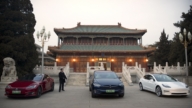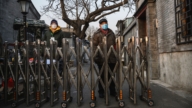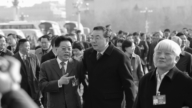【新唐人2013年04月02日訊】新加坡一研究機構,分析了中國283個中小城市的市長和市委書記,從他們10年的政績和陞遷結果發現,中國的所謂「綠色官員」陞遷難。這份研究用量化的方式,再次佐證﹕中共官場追求GDP和表面政績的問題。讓我們也一起去關心這個問題。
新加坡國立大學房地產研究院院長鄧永恆教授,3月30號公布一項研究結果,結果顯示,在中國,如果城市的市委書記和市長任期內的GDP增速,比上一任提高0.3%的話,升職概率將高於8%,如果任期內,長期把錢花在民生和環保上面,那麼,陞官的機率是負的數值。
鄧永恆建議,中國應該改變幹部考核體制。
而中央民族大學哲學和宗教學系教授趙士林指出,中共任命官員和提拔官員的標準,是不擇手段的追求所謂國內生產總值GDP。因此不管生態、且不顧一切代價。
中央民族大學哲學和宗教學系教授趙士林:「這個帳其實是非常簡單非常好算的,你用一塊錢的GDP發展,帶來四元錢的環境污染,你說哪個合算?你發展了一元錢的GDP ,要四元錢來治理,非常簡單的帳,難道算不過來嗎?就反映了我們的急功近利,反映了我們的浮躁,反映了我們前幾年的發展觀有根本問題。」
趙士林又指出,中共官員給出的GDP數字很多時候是假的。他說,大陸每年各省統計的GDP數字,比中央統計的至少高出四、五千個億,甚至有的時候高出三萬個億。
那麼假政績為甚麼如此猖獗?
趙士林說,因為官員這樣做能迅速獲得陞遷,能使自己的政治前途獲得保障。
而中國人民大學國際關係學院教授張鳴表示,這種單純追求GDP數字的GDP主義,已經在中國存在很長時間。
中國人民大學國際關係學院教授張鳴:「花在民生上都屬裡子上的,比如菜籃子工程,福利,都是看不見的。看得見的都是甚麼修路,修橋啊,蓋大樓啊就這樣的事。中國有官場的形式主義,GDP主義兩個結合一起算,就是這個結果。就是你要錢花在面上,就容易看得見,看得見就容易提升。關鍵是看它那個考核體系,關鍵是他們上級的這個,這種政績價值觀有問題。」
中共當局又為甚麼要採取這樣一種飲鴆止渴的發展模式,和政績標準呢?
趙士林指出,中共當局急功近利,只為確保自己執政的合法性和穩定性,因為短時期的發展能解決一些迫在眉睫的問題,比如貧困問題和基本生存問題。他認為,很多落後的發展中國家一開始難免碰到這個問題。
但是,趙士林認為,中國已經改革三十年了,民眾已經付出沉重的代價,現在中國必須徹底改變。
張鳴則指出,如果中國民眾的意見必須納入官員的政績考量,那麼,官員的觀念必然不同。張鳴說,中共政權不是來自民眾的授權,才造成今天中共官場的表現。
今年年初以來,有毒的霧霾籠罩了北京和中國北方。據大陸官媒《中國廣播網》報導,有經濟學家調查發現,一個地方的環保投資佔當地GDP的比例每升高0.36%,當地書記的陞遷機會便會下降8.5%。這些經濟學家認為,沒有野心的官員才會關注環境,而有野心的官員則會通過修建新路和基礎設施來提升GDP。
另外,山西省的一項調查顯示,有71%的受訪群眾認為,那些只顧經濟增長而不管環境污染的官員應該被解職。但91%的官員卻認為,這種官員應該繼續留用。
《中國新聞網》報導,全國政協委員,作家馮驥才在兩會期間指出,多個城市出現的霧霾問題,恐怕跟現在官員的政績觀念有很大關係。馮驥才說,凡是能跟政績掛上鉤的,官員就關心,跟政績無關的事情,官員往往就不關心,或者放在一邊。
採訪編輯/秦雪 後製/陳建銘
Chinese Communist Party officials Solely Pursue GDP
A research institution in Singapore did an analysis of mayors
and party secretaries from 283 small and medium-sized cities in China.
It showed that officials who respect the environment,
had difficulty getting a promotion.
This quantitative study once again proves that officials of
the Chinese Communist Party (CCP) only pursue GDP and surface achievements.
On March 30, Professor Deng Yongheng, the director of
the Real Estate Institute at the Singapore National University announced the results of a recent study.
The study shows that the possibility of an official in China
being promoted was over 8%, if the city’s GDP increased during his tenure.
If an official chose to spend money on people’s livelihood
and environmental protection, his promotion probability was reduced.
Professor Deng suggests that the appraisal system in China
should be changed.
Professor Zhao Shilin, from the philosophy and religious
department of the Central University for Nationalities, says
the CCP’s standard of promotion is based on an unscrupulous
pursuit of GDP at all costs, regardless of the ecology.
Zhao Shilin: “This is very easy to understand;
one dollar worth of GDP equals four dollars to combat its environmental pollution.
Can you figure that?—one dollar of gain in GDP
takes four dollars to clean up.
This reflects China’s seeking of quick success, impatience,
and the fundamental flaw of the concept of development in the past few years.”
Zhao Shilin also points out that the CCP’s GDP figures
are mostly fake.
Every year, GDP from all provinces are 4,500-billion yuan;
3,000-billion higher than the central government’s statistics.
Why are fake figures of accomplishment so rampant?
—because officials want to be promoted fast in order to
secure their political future.
Professor Zhang Ming, Renmin University of
China Institute of International Relations, says
this pursuit of GDP figures has been going on
in China for a long time.
Zhang Ming: “What you spend on people’s welfare
is invisible; but roads, bridges and skyscrapers are easy to see.
A combination of Chinese officialdom and GDP
will produce scenarios like this.
If you put money on things that are visible,
you get promoted—the key is the evaluation system.
The important thing is that those higher-up officials
have an achievement value problem.”
Why has the CCP chosen such a performance standard
equivalent to “drinking poison to quench ones thirst”?
Zhao Shilin says, CCP officials want to use quick success
to ensure the legitimacy and stability of their rule.
Short-term development can solve some pressing issues,
such as poverty and basic survival.
They believe that many developing countries
will run into this problem at the beginning.
However, Zhao Shilin says, China has had three decades
of reform and the public has already paid a heavy price;
he believes China must now undergo a complete change.
Zhang Ming points out that, if the Chinese people’s opinion
of officials were considered in their promotions,
the officials’views would be quite different.
But, the CCP’s authority has not come from the people,
so it leads to today’s performance of the CCP officialdom.
Since the beginning of this year, toxic smog
has enveloped Beijing and northern China.
Official media, China Broadcast Network reports that
from one economists’survey, of the local GDP ratio,
an increase of 0.36% in environmental protection investment
will decrease the secretary’s promotion probability by 8.5%.
Economists believe that, only officials with no ambition
will be concerned about the environment, otherwise,
they will just construct new roads and infrastructure
to enhance the GDP.
In addition, a survey in Shanxi Province shows
that 71% of respondents thought that
officials who are concerned only about economic growth
regardless of environmental pollution, should be removed.
Yet, 91% of the officials are shown to believe
that such officials should remain in their posts.
China News Net reported that during the CCP’s two sessions
writer Feng Jicai, also a member of the National Committee
of the Chinese People’s Political Consultative Conference,
pointed out that a smog problem in many cities might have
a lot to do with officials’ concept of political achievement.
Many officials care only about enhancing political achievements
and things that do not concern promotion will be set aside.


























